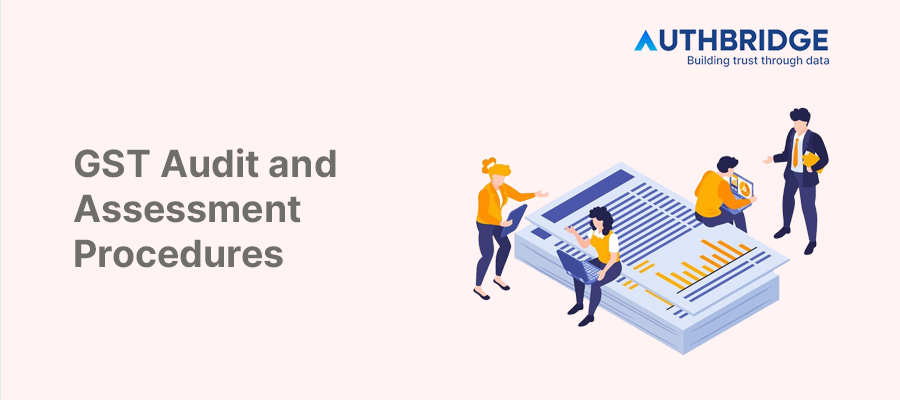Unveiling GST Audits & Assessments: A Comprehensive Guide For Businesses

The Goods and Services Tax (GST) regime in India has been a game-changer for the economic landscape, streamlining the taxation process and enhancing compliance across various sectors. GST audits and assessments are pivotal in this framework, ensuring transparency and compliance from businesses. This blog delves into the intricacies of GST audit and assessment procedures, offering a comprehensive guide for businesses to navigate these processes effectively.
GST Audit Procedures
Types of GST Audits
- Audit by Tax Authorities: A comprehensive examination conducted by GST officials to verify the accuracy of tax payments and adherence to GST laws.
- Turnover-based Audit: Mandatory for businesses with a turnover exceeding Rs. 2 crores, requiring an audit by a Chartered Accountant or a Cost Accountant.
- Special Audit: Initiated in special circumstances when there is a complexity in the accounts, necessitating an audit by a CA or CMA nominated by the department.
- Table 1: Overview of GST Audit Types
Audit Type | Trigger | Conducted by |
Tax Authority Audit | Random selection/Discrepancies | GST Officials |
Turnover-based Audit | Turnover > Rs. 2 crores | Chartered or Cost Accountant |
Special Audit | Complex cases | CA/CMA nominated by the department |
Audit Process Overview
The GST audit process involves several key steps, from the initial notification to the final audit report. Businesses must prepare by gathering necessary documents, including invoices, tax payment receipts, and financial statements.
- Table 2: GST Audit Process Steps
Step | Description |
Notification | Businesses are informed about the audit in advance. |
Preparation | Collection of relevant documents and records. |
On-site Verification | Physical verification of stocks and assets. |
Reporting | Preparation of audit report detailing findings. |
GST Assessment Procedures
GST assessments are crucial for determining tax liability and ensuring that businesses pay the correct amount of tax.
Types of Assessments
- Self-Assessment: The most common form, where businesses calculate their tax liability and file returns accordingly.
- Provisional Assessment: Applied when there is uncertainty about the tax rate or value of goods/services.
- Scrutiny Assessment: Involves the examination of returns by GST officials to verify their correctness.
- Summary Assessment: Executed in urgent cases to protect the revenue's interest.
- Best Judgement Assessment: Applied for non-filers of returns or unregistered persons.
Table 3: Types of GST Assessments
Assessment Type | Purpose | Conducted by |
Self-Assessment | Regular tax filing | Business itself |
Provisional Assessment | Uncertain tax rate/value | GST Officer |
Scrutiny Assessment | Verify return correctness | GST Officer |
Summary Assessment | Urgent tax liability cases | GST Officer with higher authority's permission |
Best Judgement Assessment | Non-filers/unregistered persons | GST Officer |
Compliance Challenges and Solutions
Navigating GST audits and assessments can be challenging, especially for small and medium enterprises (SMEs) that may lack the resources for comprehensive compliance management.
Common Compliance Issues
- Misclassification of goods/services leading to incorrect tax rates.
- Inaccurate record-keeping and documentation.
- Delays in filing returns or making tax payments.
Strategies for Effective Compliance
- Maintaining Accurate Records: Implementing robust accounting software that is GST-compliant can significantly reduce errors in record-keeping.
- Regular Reconciliation: Reconciling GST returns with financial statements regularly helps identify discrepancies early.
- Staying Informed: Keeping abreast of the latest GST regulations and guidelines is crucial for compliance.
Recent Developments in GST Audit and Assessment
The GST Council continually reviews and updates audit and assessment procedures to simplify compliance and address challenges faced by businesses. Recent developments include the introduction of automated scrutiny of returns and the simplification of the audit process for SMEs.
Conclusion
GST audits and assessments are integral to the GST framework, ensuring compliance and transparency in tax administration. By understanding these procedures and adopting effective compliance strategies, businesses can mitigate risks and contribute to the growth of the economy. As the GST landscape evolves, staying informed and prepared is key to navigating audits and assessments successfully.
Category

Abhinandan Banerjee
(Associate Manager - Marketing)
Abhinandan is a dynamic Product and Content Marketer, boasting over seven years of experience in crafting impactful marketing strategies across diverse environments. Known for his strategic insights, he propels digital growth and boosts brand visibility by transforming complex ideas into compelling content that inspires action.



